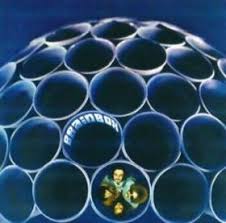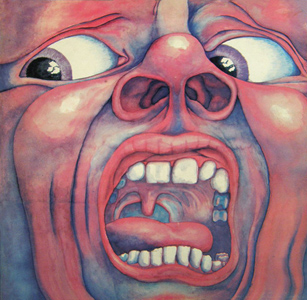If 1967 was a pretty nascent year for prog rock, the following year would prove to be even more so. Bands who would rise to become true giants in the field would be formed in 1968, though many of them would not release their first album for another year, even two in some cases, and then, their debuts would not always be the groundbreaking classics later ones would grow to be. I guess if you consider 1967 --- and to some smaller extent, 1966 --- as the nursery years of prog rock, 1968 was when the chicks began hatching; breathing the air but as yet nowhere near strong enough to fly.
Put another way, the seeds that had been sown were beginning to grow, but would still need a whole lot of sunshine before they could bear any fruit. Once they did, though, everyone would want a taste! Here then are some of the important bands that got together this year.
Note: as this gets a little closer to the sort of prog rock I’m familiar with, I’m introducing a new category, which with typical self-effacement and humility I’m calling “The Trollheart Factor”. This is an indication of how well, if at all, I know and am familiar with the artiste in question, and how qualified I am therefore to speak about them. I’ll also add this to album reviews, as even though I may know some artistes well, there may be albums of theirs I’m not that well versed in.
Further note: since I’ve a pain in my arse writing the word “incarnation” all the time, I’m in future going to indicate each time the band reformed with a Roman numeral (bein’ a bit of a pretentious git), so the original lineup will be (i), a reformed one (ii), the next (iii) and so on, put after the relevant years.
Even further note: for those bands or artistes with which I am very unfamiliar or even know nothing about, and where I can't determine quickly their impact on the subgenre, I will just put a question mark, and it can be amended later, when I've read more about them or listened to them.
Amon Düül II (1968 – )
Nationality: German
Original lineup: Chris Karrer, Dieter Serfas, Falk Rogner, John Weinzierl and Renate Knaup
First relevant album: Phallus Dei, 1969
 Impact:
Impact: 6
The Trollheart Factor: 0
Linked to:
Progenitors of what would become known as Krautrock, Amon Düül II grew up out of a hippy commune in Germany, where the music really originally came second to paying the bills to keep the camp open. Apparently in the beginning they worked really hard ---
”The band played almost every day” according to Wiemzierl. “We played universities, academies, underground clubs, and every hall with a power socket and an audience.”
Art Zoyd (1968 - )
Nationality: French
Original lineup: Gerard Hourbette
First relevant album: Symphonie pour le jour où brûleront les cités, 1976
Impact: ?
The Trollheart Factor: 0
Linked with:
French avant-garde, free jazz and experimental band that seems to have been under the direction of one man, the abovenamed Gerard Hourbette. Part of the Rock In Opposition movement.
Brainbox (1969-1972 (i), 2004 - (ii))
Nationality: Dutch
Original lineup: Jan Akkerman, Pierre van der Linden, Kazimir Lux
First relevant album: Brainbox, 1969
 Impact:
Impact: 4
The Trollheart Factor: 0
Linked with: Focus
Most famous as the launching board for Focus, Brainbox released three albums(including, weirdly, a “Best of” after just one album!) before they split in 1972. They reunited in 2004 and have since released another two albums plus a live one, the last being put out in 2011.
Can (1968 - 1979, (i)1986 - 1989 (ii))
Nationality: German
Original lineup: Michael Karoli (RIP), Jaki Lebezeit, Irmin Schmidt, Holger Czukay, David C. Johnson, Malcolm Mooney
First relevant album: Monster Movie, 1969
 Impact:
Impact: 9
The Trollheart Factor: 0
Linked with:
Another band instrumental in the Krautrock era, Can are one of the most well-remembered and artistes from Joy Division and The Fall to Bowie and Talking Heads cite them as an influence on their music, with Brian Eno composing a short movie in tribute to them. Although they disbanded in 1979 they reunited seven years later to record one more album. There were sporadic other appearances by them over the years, but since these usually concerned recording a track or a live performance I’m not counting them. They remain however a huge influence right across the music world, from jazz to avant-garde to electronica and of course prog rock.
Caravan (1968 - 1978 (i) 1980 - 1985 (ii) 1990 -1992 (iii) 1995 - (iv))
Nationality: British
Original lineup: David Sinclair, Richard Sinclair, Pye Hastings, Richard Coughlan (RIP)
First relevant album: Caravan, 1968
 Impact:
Impact: 8
The Trollheart Factor: 0
Linked with: Soft Machine, The Wilde Flowers
One of the premier bands in what would become known as the Canterbury Scene, Caravan were not a commercially successful band, but then, a large percentage of prog rock bands can say the same thing, and the real success lies in the legacy they leave behind and the bands they influenced.
Deep Purple (1968 - 1976)
Nationality: British
Original lineup: Rod Evans, Nick Simper, Jon Lord, Ian Paice, Ritchie Blackmore
First relevant album: Shades of Deep Purple, 1968 (but really
Deep Purple in Rock, 1970)
 Impact:
Impact: 3
The Trollheart Factor: 5
Linked with: Rainbow, Whitesnake, Ian Gillan Band, Roundabout
I don’t really want to get bogged down too much exploring or talking about bands who were more or less just on the fringes of the progressive rock scene and who made their name in other spheres, and this certainly applies to Deep Purple, whom everyone will know as primarily a hard rock or even heavy metal band. But they began as prog rock and it might (might, depending on how many albums were released in this year) be interesting to see the direction they had originally been heading in. I’m also only recording their active years above as the times when they played what could be termed progressive rather than hard rock.
Henry Cow (1968 - 1978)
Nationality: British
Original lineup: Tim Hodgkinson, Fred Frith, Lindsay Cooper, Chris Cutler
First relevant album: Legend, 1973
 Impact:
Impact: ?
The Trollheart Factor: 0
Linked with:
One of the few British RIO bands, Henry Cow seemed determined to stay out of the mainstream, even of progressive rock, and they seemed to compose their music by committee, having actual meetings where they thrashed out the ideas and decided which ones to use and which to discard. Their music has been described as inaccessible, overcomplicated and brilliantly innovative.
King Crimson (1968 - 1974 (i) 1981-1984 (ii) 1994 - 2004 (iii) 2007 - 2008 (iv) 203 - (v))
Nationality: British
Original lineup: Robert Fripp, Peter Sinfield, Greg Lake, Ian MacDonald
First relevant album: In the court of the Crimson King, 1969
 Impact:
Impact: 10
The Trollheart Factor: 0
Linked with: A host of acts, including but not limited to 21st Century Schizoid Band, ProjeKCts, UK, Giles, Giles and Fripp, Crimson Jazz Trio and Porcupine Tree
One of the true giants of the progressive rock scene, King Crimson bestrode the movement like a colossus. Or so I’m told. Personally, I’ve never heard anything by them, and while this may be reason in some people’s minds to sting me up with the strings of a Hammond, I readily admitted when I began this journey that there were prog rock bands, many of them considered essential to the genre, whom I had not heard, and Crimson are one of them. Needless to say, I’ll be redressing that here. Driven by the genius and some would say tyranny of founder Robert Fripp, King Crimson shied from the pop song, or melodies too easy to play, and they certainly did not seem to court (sorry) chart success. Yet they have remained both one of the most influential bands not only in progressive rock but in music as a whole, and continue to confound their critics, still rocking after over forty-five years.
Rush (1968 - )
Nationality: Canadian
Original lineup: Geddy Lee, John Rutsey, Alex Lifeson
First relevant album: Fly by night, 1975
 Impact:
Impact: 9
The Trollheart Factor: 7
Linked with:
Beginning life as a blues rock band with their debut album, Rush soon began incorporating fantasy lyrics and themes into their music with the release of their second album, and quickly identified with the progressive rock crowd. One of the first, if not the first, progressive rock bands to come out of Canada, they have remained with pretty much the same lineup since 1974, always a power trio, and singer Geddy Lee has become famous for his high-pitched, often falsetto vocals. Rush released some of the most seminal prog rock albums of the seventies, including
2112, Caress of steel, A farewell to kings and
Hemispheres.
The United States of America (1967 - 1968)
Nationality: American
Original lineup: Joseph Byrd, Dorothy Moskowitz, Gordon Marron, Rand Forbes, Craig Woodson, Ed Bogas
First relevant album: The United States of America, 1968
 Impact:
Impact: ?
The Trollheart Factor: 0
Linked with:
These poor guys split after recording only one album. Despite being the only band at the time I know of (as if that means anything!) to use instruments like calliope, harpsichord, fretless bass and electric violin, and not have any guitars at all, tensions within the band led to their disbanding a year after they got together. Their single album has however gone down in the annals of the history of prog rock, psychedelic music and avant-garde rock, it says here.
Yes (1968 - 1981 (i) 1984 - 2004 (ii) 2008 - (iii)
Nationality: British
Original lineup: Jon Anderson, Chris Squires, Peter Banks, Tony Kaye, Bill Bruford
First relevant album: Yes, 1969
 Impact:
Impact: 10
The Trollheart Factor: 6
Linked with: The Buggles, The Syn, Anderson Bruford Wakeman Howe
Another giant of the genre, Yes built their appeal and their fame on intricate keyboard passages, long, multi-part songs, and the soaring soprano voice of Jon Anderson. Some of their songs took up one full side of an album (Close to the edge, Tales from topographic oceans) and as a result, though hugely popular in the seventies they became identified as one of the bands against whom the punk rock backlash hit out, calling music such as they played pompous, overblown, and irrelevant. Well, they probably called it pretentious shi
te, but we’re not going to say that here.